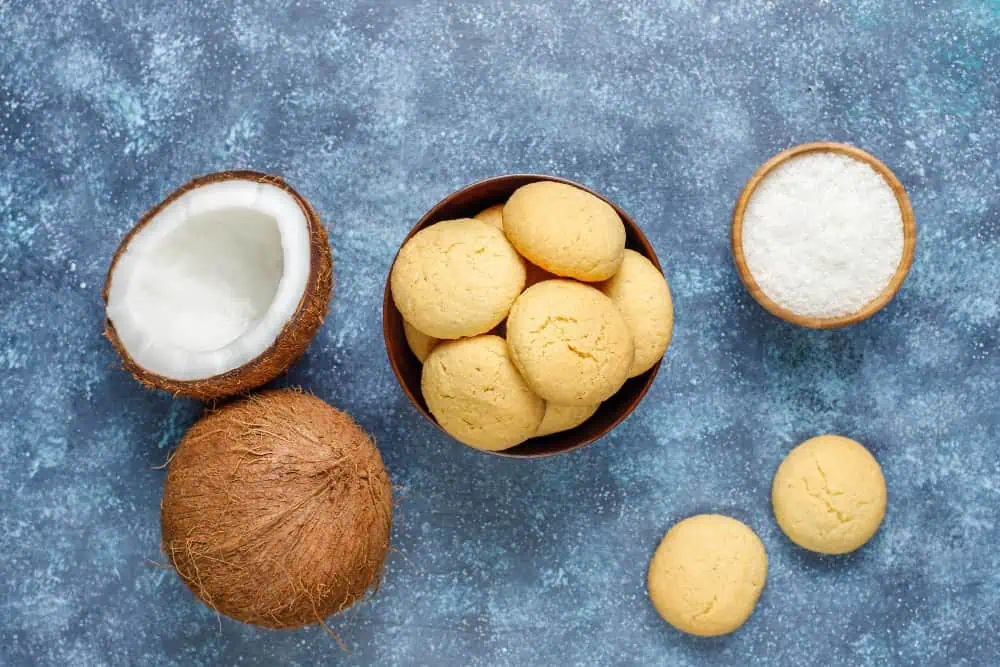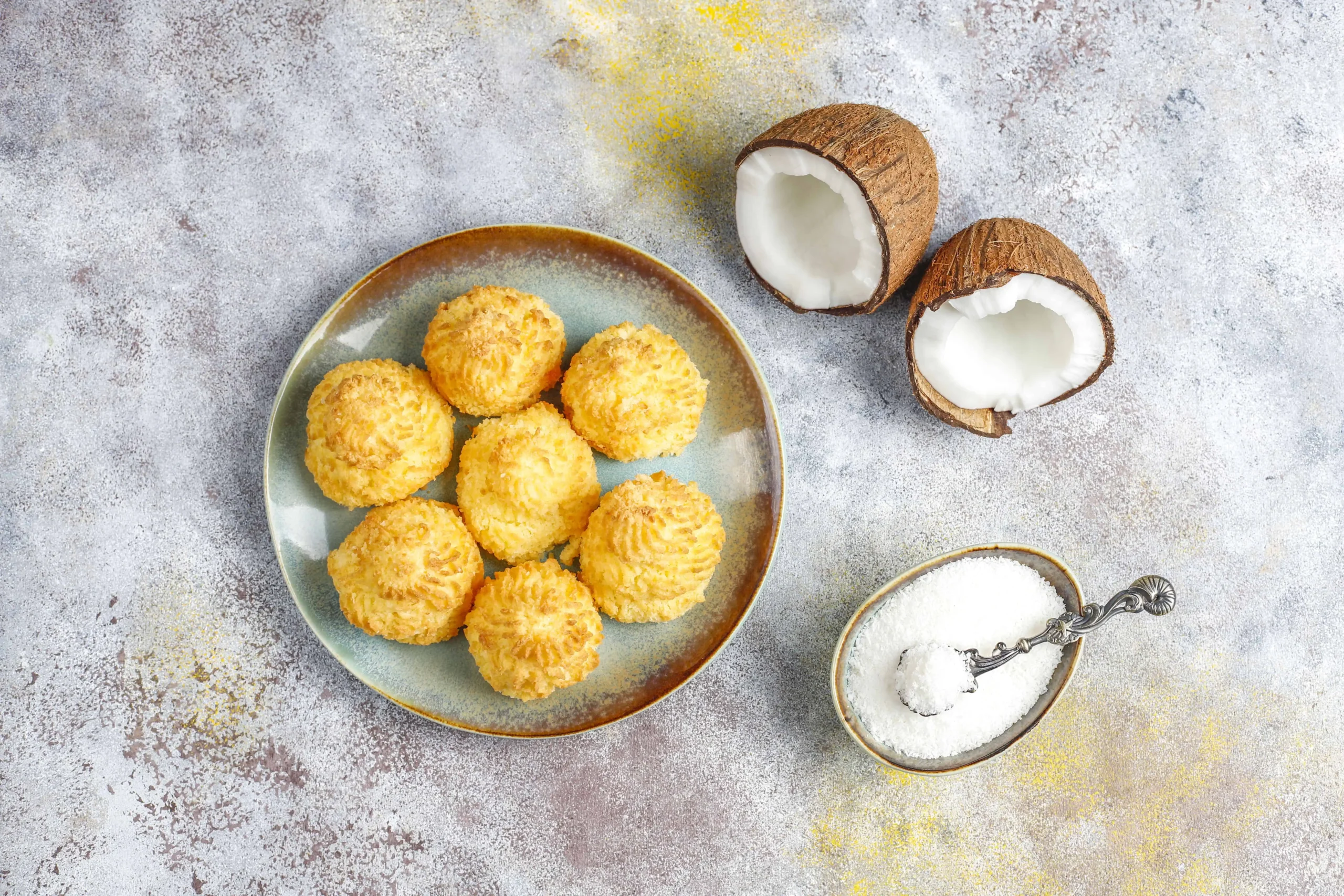Coconut cookies are a delicious treat enjoyed by many, but if you’re health-conscious, you might wonder: Are coconut cookies healthy for you? The answer isn’t as straightforward as a simple yes or no—it depends on the ingredients, portion sizes, and how they fit into your overall diet. In this article, we’ll dive deep into the nutritional aspects of coconut cookies, their potential health benefits, and how to make healthier versions at home. Let’s explore everything you need to know about this tropical-inspired dessert!
What Are Coconut Cookies?
Coconut cookies are baked treats made with coconut as a primary ingredient. They often include shredded coconut, coconut flour, or coconut oil, giving them a distinct tropical flavor and chewy texture. These cookies can be made with various other ingredients, such as sugar, butter, eggs, and flour, depending on the recipe.
While they’re undeniably tasty, the question remains: Are coconut cookies healthy for you? To answer this, we need to look at their nutritional profile and the health benefits of their key ingredients.
Nutritional Profile of Coconut Cookies
The nutritional value of coconut cookies can vary widely depending on the recipe. Here’s a general breakdown of what you might find in a standard coconut cookie (per 1 medium-sized cookie, approximately 30g):
- Calories: 120–150
- Carbohydrates: 15–20g
- Sugar: 8–12g
- Fat: 6–8g
- Protein: 1–2g
- Fiber: 1–2g
Key Ingredients in Coconut Cookies
To understand whether coconut cookies are healthy, let’s examine their main ingredients:
- Coconut:
- Rich in healthy fats (medium-chain triglycerides or MCTs).
- Contains dietary fiber, which supports digestion.
- Provides essential minerals like manganese and copper.
- Sugar:
- Adds sweetness but contributes to empty calories.
- Excessive sugar intake can lead to weight gain and other health issues.
- Flour:
- Traditional recipes use refined flour, which is low in nutrients.
- Healthier versions may use coconut flour or almond flour, which are gluten-free and nutrient-dense.
- Butter or Coconut Oil:
- Butter is high in saturated fat, while coconut oil contains MCTs that may boost energy and metabolism.
Are Coconut Cookies Healthy for You?
The healthiness of coconut cookies depends on how they’re made and consumed. Let’s break it down:
Potential Health Benefits of Coconut Cookies
- Rich in Healthy Fats:
Coconut contains MCTs, which are easily digested and may provide a quick energy boost. These fats are also linked to improved brain function and metabolism. - Good Source of Fiber:
Coconut-based cookies often contain dietary fiber, which supports digestion and helps you feel full longer. - Nutrient Content:
Coconut is a good source of manganese, which supports bone health and metabolism, and copper, which aids in iron absorption. - Gluten-Free Options:
If made with coconut flour or almond flour, coconut cookies can be a great option for those with gluten sensitivities or celiac disease. - Antioxidant Properties:
Coconut contains phenolic compounds that have antioxidant properties, which can help combat oxidative stress in the body.
Potential Downsides of Coconut Cookies
- High in Calories:
Coconut cookies are calorie-dense, which can lead to weight gain if consumed in excess. - High Sugar Content:
Many recipes use refined sugar, which can spike blood sugar levels and contribute to health issues like diabetes and obesity. - Saturated Fat:
While coconut oil and butter contain saturated fats, excessive consumption may raise cholesterol levels in some individuals. - Additives and Preservatives:
Store-bought coconut cookies may contain additives and preservatives that can detract from their health benefits. Always check the ingredient list. - Portion Control:
It’s easy to overindulge in cookies, which can lead to excessive calorie intake. Being mindful of portion sizes is crucial.

How to Make Coconut Cookies Healthier
If you love coconut cookies but want to make them healthier, here are some tips:
1. Use Natural Sweeteners
- Replace refined sugar with natural alternatives like honey, maple syrup, or coconut sugar. These options have a lower glycemic index and provide trace nutrients.
2. Opt for Whole-Grain or Alternative Flours
- Swap refined flour for whole-grain flour, coconut flour, or almond flour. These options are higher in fiber and nutrients.
3. Incorporate Healthy Fats
- Use coconut oil or avocado oil instead of butter to reduce saturated fat content.
4. Add Nutrient-Dense Ingredients
- Mix in nuts, seeds, or dark chocolate chips for added protein, healthy fats, and antioxidants.
5. Control Portion Sizes
- Stick to smaller cookies or limit yourself to one or two per serving to avoid overindulging.
6. Experiment with Flavorings
- Enhance the flavor without adding sugar by using spices like cinnamon or nutmeg, or adding vanilla extract or almond extract.
7. Include Protein Sources
- Consider adding protein powder or nut butter to the cookie dough to increase the protein content, making them more filling.
Healthier Coconut Cookie Recipe
Here’s a simple recipe for healthier coconut cookies that you can try at home:
Ingredients:
- 1 cup shredded unsweetened coconut
- 1/2 cup almond flour
- 1/4 cup coconut sugar
- 1/4 cup coconut oil (melted)
- 1 egg (or flaxseed egg for a vegan option)
- 1 tsp vanilla extract
- 1/2 tsp baking powder
- Pinch of salt
- Optional: 1/4 cup dark chocolate chips or chopped nuts
Instructions:
- Preheat your oven to 350°F (175°C) and line a baking sheet with parchment paper.
- In a bowl, mix the shredded coconut, almond flour, coconut sugar, baking powder, and salt.
- Add the melted coconut oil, egg, and vanilla extract. Stir until well combined.
- If desired, fold in dark chocolate chips or nuts for added flavor and nutrition.
- Scoop small portions of the dough onto the baking sheet and flatten slightly.
- Bake for 10–12 minutes or until the edges are golden brown.
- Let the cookies cool before serving. Enjoy!
Coconut Cookies Around the World
Coconut cookies are enjoyed in various forms across different cultures. Here are a few examples:
1. Macaroons
- Origin: Italy
- Description: These are sweet mounds of shredded coconut, often dipped in chocolate. They are chewy and rich, making them a popular treat.
2. Kue Cubir
- Origin: Indonesia
- Description: These are traditional Indonesian coconut cookies made with rice flour and coconut milk, giving them a unique texture and flavor.
3. Coconut Biscotti
- Origin: Italy
- Description: A crunchy, twice-baked cookie that often includes coconut flakes, perfect for dipping in coffee or tea.
4. Coconut Macaroon Bars
- Origin: United States
- Description: A variation of the traditional macaroon, these bars are often layered with chocolate and have a chewy coconut base.
5. Coconut Shortbread
- Origin: Scotland
- Description: A buttery shortbread cookie that incorporates shredded coconut for added flavor and texture.
These variations highlight the versatility of coconut as an ingredient and how it can be adapted to different culinary traditions.

FAQs: Are Coconut Cookies Healthy for You?
1. Are coconut cookies good for weight loss?
Coconut cookies can be part of a weight-loss diet if consumed in moderation and made with healthier ingredients like coconut flour, natural sweeteners, and minimal added sugar. However, they are calorie-dense, so portion control is key.
2. Are coconut cookies gluten-free?
Traditional coconut cookies made with regular flour are not gluten-free. However, recipes using coconut flour, almond flour, or other gluten-free alternatives are safe for those with gluten sensitivities.
3. Do coconut cookies have a lot of sugar?
Many coconut cookie recipes contain significant amounts of sugar. To make them healthier, you can reduce the sugar or use natural sweeteners like honey or coconut sugar.
4. Are coconut cookies vegan?
Most traditional coconut cookies are not vegan because they contain butter and eggs. However, you can make vegan coconut cookies by using plant-based substitutes like coconut oil and flaxseed eggs.
5. Are coconut cookies keto-friendly?
Coconut cookies can be keto-friendly if made with low-carb ingredients like almond flour, coconut flour, and sugar substitutes such as erythritol or stevia.
6. How can I store coconut cookies?
Store coconut cookies in an airtight container at room temperature for up to a week. For longer storage, freeze them in a sealed bag for up to 3 months.
7. Can I make coconut cookies without eggs?
Yes! You can substitute eggs with flaxseed meal mixed with water (1 tablespoon of flaxseed meal + 2.5 tablespoons of water = 1 egg) or use applesauce or mashed bananas as a binding agent.
8. What are some variations of coconut cookies?
You can experiment with different flavors by adding ingredients like chocolate chips, nuts, dried fruits, or spices such as cinnamon and nutmeg to your coconut cookie dough.
Coconut Cookies vs. Other Cookies: Which Is Healthier?
When comparing coconut cookies to other types of cookies, their healthiness depends on the ingredients used. Here’s a quick comparison:
- Coconut Cookies:
- Higher in healthy fats and fiber (if made with coconut flour or shredded coconut).
- Can be gluten-free and keto-friendly with the right recipe.
- Chocolate Chip Cookies:
- Typically higher in sugar and refined flour.
- Lower in fiber and healthy fats.
- Oatmeal Cookies:
- Higher in fiber due to oats.
- Can be made healthier with less sugar and added nuts or seeds.
- Peanut Butter Cookies:
- High in protein and healthy fats.
- Often contain added sugar and refined flour.
- Sugar Cookies:
- Generally high in sugar and low in nutrients.
- Often made with refined flour and butter.
Conclusion
Coconut cookies can be a delightful treat that offers some health benefits, especially when made with wholesome ingredients. They can be a part of a balanced diet if consumed in moderation and prepared thoughtfully. By making small tweaks to your recipe and practicing portion control, you can enjoy coconut cookies as part of a healthy lifestyle.
Final Verdict: Are Coconut Cookies Healthy for You?
So, are coconut cookies healthy for you? The answer depends on how they’re made and how much you eat. Coconut cookies can be a healthier option compared to traditional cookies if they’re made with nutrient-dense ingredients like coconut flour, natural sweeteners, and healthy fats. They also offer some unique benefits, such as being gluten-free and rich in MCTs.
However, like any dessert, they should be enjoyed in moderation. By making small tweaks to your recipe and practicing portion control, you can enjoy coconut cookies as part of a balanced diet.
Related Questions
1. What are the health benefits of coconut?
Coconut is rich in healthy fats, fiber, and essential minerals like manganese and copper. It may support digestion, boost energy, and improve brain function.
2. Can I eat coconut cookies every day?
While it’s okay to enjoy coconut cookies occasionally, eating them daily may lead to excessive calorie and sugar intake. Balance is key.
3. What are some alternatives to coconut cookies?
If you’re looking for other healthy cookie options, try oatmeal cookies, almond flour cookies, or peanut butter cookies made with natural sweeteners.
4. How can I store coconut cookies?
Store coconut cookies in an airtight container at room temperature for up to a week. For longer storage, freeze them in a sealed bag for up to 3 months.
5. What are some tips for baking coconut cookies?
- Use fresh ingredients: Ensure your coconut is fresh and unsweetened for the best flavor.
- Don’t overmix: Mix just until combined to keep the cookies tender.
- Experiment with baking times: Every oven is different, so keep an eye on your cookies to avoid overbaking.
Conclusion
Coconut cookies are a delightful treat that can be made healthier with the right ingredients and portion control. Whether you’re looking for a gluten-free dessert, a keto-friendly snack, or just a tasty way to enjoy the benefits of coconut, these cookies can fit into your lifestyle. Remember, the key to enjoying coconut cookies is moderation and mindful ingredient choices. So, go ahead and indulge in this tropical treat—guilt-free!
Are coconut cookies healthy for you? Now you know the answer! If you’re looking for more quick and healthy recipes, check out our other posts on EatQuickRecipes.com.

